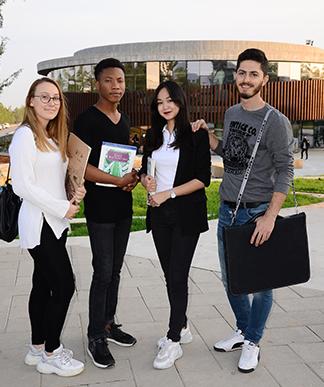Education For Mental Disabilities (MA)



About the Program
Mentally Handicapped Teaching Master’s Program teaches its students how to: evaluate the skills of children/individuals with mental impairments in all developmental areas; support all stages of development with individualized programs; provide services for the family as well as children/individuals; and inform the community about the field. During the program, the students prepare a thesis in their own branches after completing the required courses. If the thesis is deemed successful in the thesis defense, the students are entitled to receive a "Master’s Degree" diploma in the Mentally Handicapped Teaching Master’s Program.
Education Opportunities
Our program has qualified academic staff with two professors, one associate professor, two assistant professors and two lecturers for providing education. The students study in intelligent classrooms, computer laboratories for computer-based projects, and studios and drama rooms for art- and game-based projects.

Career Areas
The main goal of the individuals who graduate from the Mentally Handicapped Teaching Master’s Program is to support the development of children in the 0-18 age group; children with special needs; vulnerable children and children at the risk group. As a specialist professional, the graduates will be expected to: develop tools to evaluate the development of special needs children; provide consultancy services to the related institutions and organizations in the field; and provide publishing and research services. Using contemporary approaches, the graduates develop community-oriented projects for the field and disseminate them. Professional staff can take part in social spaces, child and youth centers, community centers, rehabilitation centers, related ministries. They can work as academic staff in the field of education at higher education institutions for associate degree or undergraduate students.
Contact
Institute of Graduate Studies and Research
Graduate Sciences and Education Center, GE106
Tel: +90 392 671 1111 Extension: 2776
Institute E-mail: ciu-institute@ciu.edu.tr
Compulsory Courses
First Semester
CONCEPTUAL AND THEORETICAL BASIS OF MENTAL DISABILITY
Course code
ZEEG501Credit
3Theoretical
3Practical
0Ects
8SEMINAR
Course code
ZEEG590Credit
0Theoretical
0Practical
0Ects
4SEÇMELI
Course code
ZEEG5X1Credit
3Theoretical
3Practical
0Ects
8SEÇMELI
Course code
ZEEG5X2Credit
3Theoretical
3Practical
0Ects
8Second Semester
RESEARCH METHODS IN SOCIAL SCIENCES
Course code
ZEEG503Credit
3Theoretical
3Practical
0Ects
8SEÇMELI
Course code
ZEEG5X3Credit
3Theoretical
3Practical
0Ects
8SEÇMELI
Course code
ZEEG5X4Credit
3Theoretical
3Practical
0Ects
8SEÇMELI
Course code
ZEEG5X5Credit
3Theoretical
3Practical
0Ects
8Third Semester
THESIS
Course code
ZEEG500Credit
0Theoretical
0Practical
0Ects
60Elective Courses
BRING SOCIAL SKILLS TO THE MENTAL DISABLED
Course code
ZEEG514Credit
3Theoretical
3Practical
0Ects
8FAMILY EDUCATION FOR THE MENTAL DISABLED
Course code
ZEEG510Credit
3Theoretical
3Practical
0Ects
8SPECIAL EDUCATION IN EARLY CHILDHOOD
Course code
ZEEG511Credit
3Theoretical
3Practical
0Ects
8PREPARING INDIVIDUALIZED TRAINING PROGRAM
Course code
ZEEG505Credit
3Theoretical
3Practical
0Ects
8SELF-MANAGEMENT STRATEGIES
Course code
ZEEG506Credit
3Theoretical
3Practical
0Ects
8SINGLE SUBJECT RESEARCH METHODS
Course code
ZEEG518Credit
3Theoretical
3Practical
0Ects
8APPLIED BEHAVIOR ANALYSIS IN THE EDUCATION OF THE MENTAL DISABLED
Course code
ZEEG507Credit
3Theoretical
3Practical
0Ects
7QUALITATIVE RESEARCH METHODS
Course code
ZEEG522Credit
3Theoretical
3Practical
0Ects
8EDUCATIONAL-BEHAVIORAL ASSESSMENT AND EVALUATION
Course code
ZEEG207Credit
0Theoretical
0Practical
0Ects
0INDIVIDUALIZED EDUCATIONAL PLANS AND INDIVIDUALIZATION OF EDUCATION
Course code
EGIT309Credit
0Theoretical
0Practical
0Ects
0ERKEN ÇOCUKLUKTA ÖZEL EĞITIM
Course code
OZEG203Credit
0Theoretical
0Practical
0Ects
4UYGULAMALI DAVRANIŞ ANALİZİ
Course code
ZEEG205Credit
0Theoretical
0Practical
0Ects
FAMILY EDUCATION IN SPECIAL EDUCATION
Course code
OZEG304Credit
0Theoretical
3Practical
0Ects
2ÖZEL EĞİTİMDE OKUMA-YAZMA ÖĞRETİMİ
Course code
OZEG301Credit
0Theoretical
0Practical
0Ects
APPLIED BEHAVIOR ANALYSIS
Course code
OZEG205Credit
0Theoretical
0Practical
0Ects
4ÖZEL EĞİTİMDE DEĞERLENDİRME
Course code
OZEG211Credit
0Theoretical
0Practical
0Ects
Students who are interested in pursuing advanced graduate studies leading to a master’s, doctoral degree, or professional doctorate degree for the Fall and Spring semesters every year. Applicants can directly apply online to our graduate programs using the application portal.
TRNC Applicants- Required documents:
- Bachelor’s Degree Diploma
- Bachelor’s Degree transcripts for each completed academic term/year.
- Documents to prove English proficiency for English language departments,
- Scanned copy of passport or identity card.
Click for detailed admission requirements information.
Students who are interested in pursuing advanced graduate studies leading to a master’s, doctoral degree, or professional doctorate degree for the Fall and Spring semesters every year. Applicants can directly apply online to our graduate programs using the application portal.
International Applicants- Required documents:
- Bachelor’s Degree Diploma
- Bachelor’s Degree transcripts for each completed academic term/year.
- Evidence of English Language competence: TOEFL (65 IBT) or IELTS (5.5). Students without these documents will take the CIU English proficiency exam on campus following arrival.
- Scanned copy of international passport/birth certificate
- CV
- Fully completed and signed CIU Rules and Regulations document (which can be downloaded during the online application)
Click for detailed admission requirements information.
Cyprus International University provides academic scholarships for its students as an incentive for success, with most students benefiting from 50%, 75% or 100% scholarships or discounted tuition fees. Click for more information.
Tuition Fees are determined at the beginning of each academic year. Candidate students who are entitled to enroll in CIU can learn their fees in line with the Tuition Fee Calculation system.